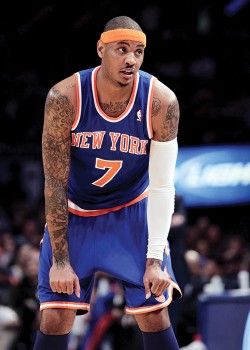By the time this column drops, the first seven games of the NBA season will be a distant memory. Once Tuesday rolls around and this paper is in your hands, most of the league will have played two whole games beyond that. We’ll have a brand new set of power rankings, and we’ll all feel pretty silly that we were ever even talking about those first seven.
Early returns
By the time this column drops, the first seven games of the NBA season will be a distant memory. Once Tuesday rolls around and this paper is in your hands, most of the league will have played two whole games beyond that. We’ll have a brand new set of power rankings, and we’ll all feel pretty silly that we were ever even talking about those first seven.

COURTESY OF UPI/John Angelillo
Place your bets: Carmelo Anthony and the Knicks have surprised many with their strong start.
But as I’ve said, I’m still on this side of that great divide, the horseless carriage to your flying car. I come from a simpler time, a time when an infinitesimally small sample size can be the elixir of infinite hope. A time when early season overachievers are hard at work effusively weaving their own narratives to explain their success in unquantifiable terms.
In other words, a time of buying in.
The New York Knicks are the poster children for the “buy in” portion of this year’s NBA season. They won their first six games of the year, including impressive victories over defending champions the Miami Heat and the perennially sturdy San Antonio Spurs. The Knicks accomplished this feat by doing things they haven’t been known for in recent years: taking care of the basketball, making extra passes, moving without the ball, playing committed defense and shooting an excellent three-point percentage.
They also did so because two of their most talented players, Carmelo Anthony and J.R. Smith, are discovering that what they believed they could do on a basketball court is inconsequential next to what they are supposed to do and have so far managed to maximize their talent, taking the sermons of their defense-minded coach to heart and coexisting on a team with more than its fair share of outsized egos.
Now it seems that all anyone can talk about is how the Knicks are finally “buying in.”
This is a dangerous explanation for a team’s good fortune, however, because it is an implicit admission that you aren’t completely sure why things are going so well. That’s fine if there genuinely are no concrete reasons for your achievements. But if there are real, observable factors contributing to your success during any stretch of the season, it would be nice to be able to identify them, so that when you hit a rough patch late in the year or find yourself struggling on the second night of a back-to-back, you’ll have actual solutions instead of platitudes.
If I were a Knicks fan listening to Anthony pontificate on what’s different about the team this season, I would pray that he bypassed all the talk about buying in and said something more along the lines of, “Well, this year, I’m actually trying on defense. And I decided to pass the ball every four possessions, which I’m not used to. And J.R. stopped taking stupid shots with 20 seconds left on the shot clock. And Raymond Felton isn’t fat this year, so that’s nice.”
Recognizing exactly what it is that has led to your team’s improvement not only helps you to continue improving, it makes you accountable to those changes. As a team, you aren’t either buying in or not; you’re either playing sound basketball with maximum effort, or you’re not. The rest is just noise.
NBA teams become winners for three reasons: talent, coaching and cohesion. In a way, these are nebulous terms, too; each element bleeds into the others in imprecise ways, pulling and pushing with disproportional force and varying degree. But they are absolutely not matters of faith. It isn’t necessary to buy into concepts like these—they are undeniable, built upon past evidence and clearly discernible results. And if a team lacks them, no alternative set of factors can be bought into fervently enough to overcome their absence.
You know who never says a word about “buying in”? The Miami Heat. Remember that when they are sweeping the Knicks in the second round of the playoffs this spring.





